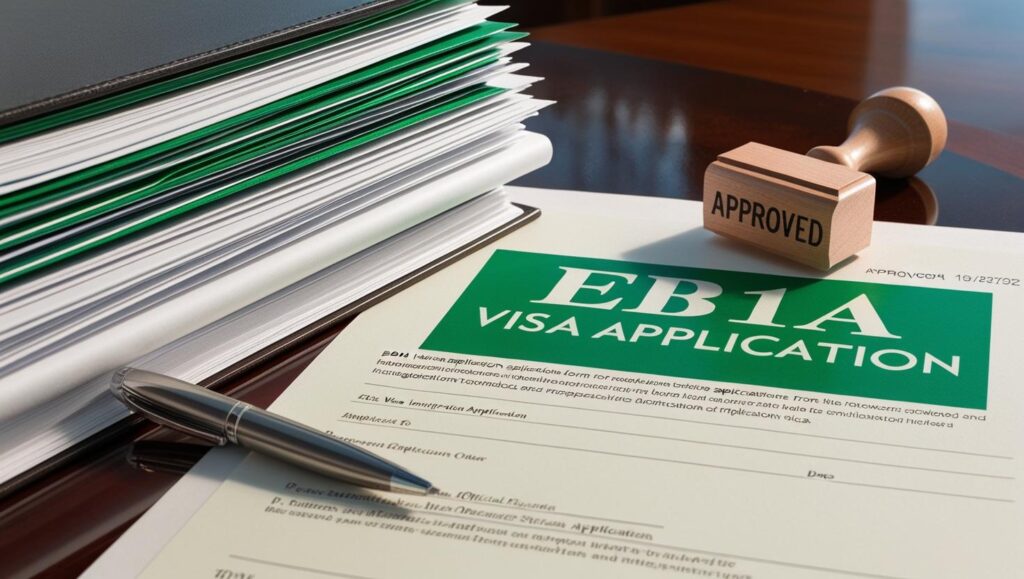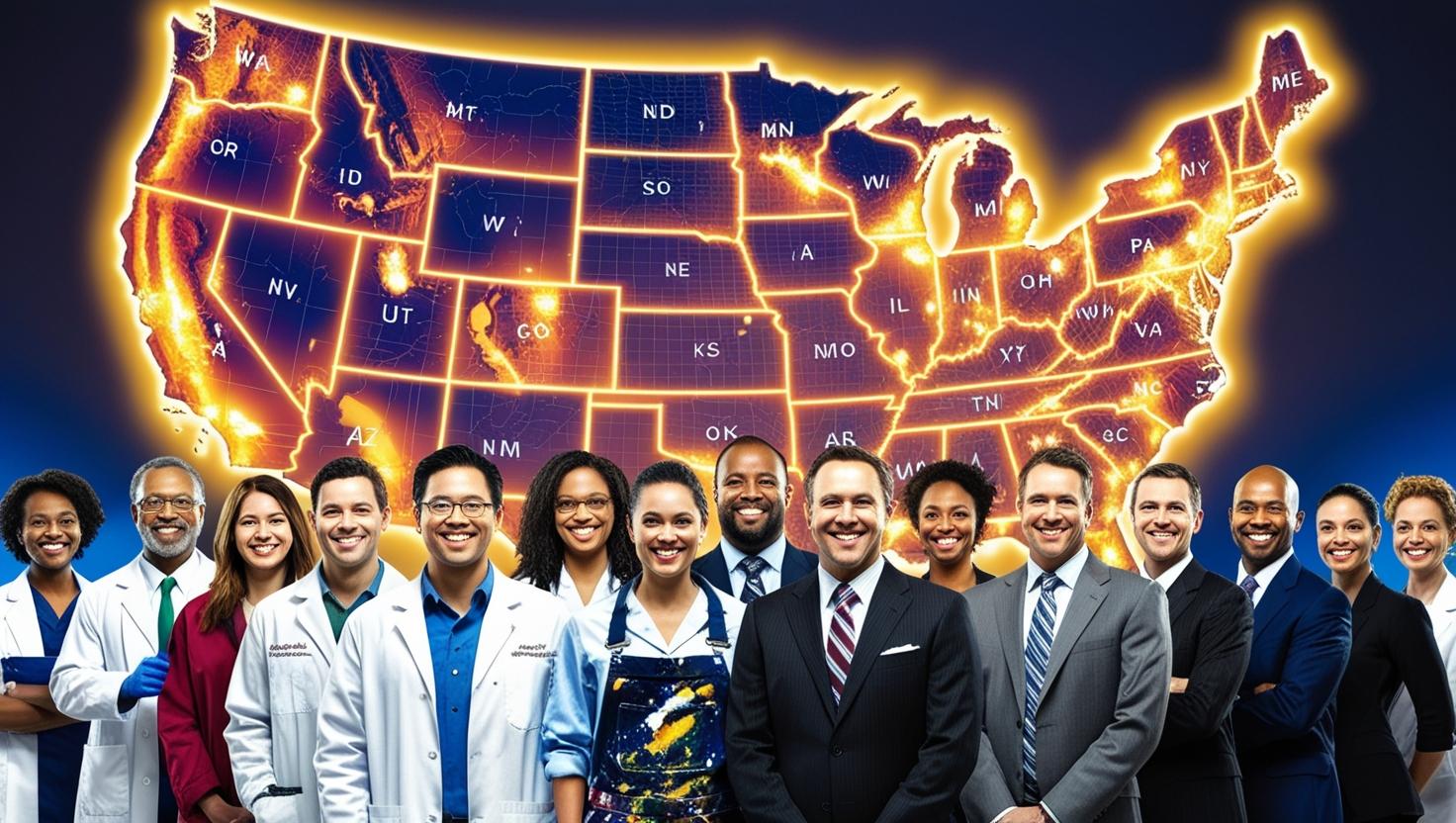Imagine working hard for years, winning awards, and being recognized worldwide. Yet, you might wonder how to use your talent to live and work in the United States. The EB1A visa offers a chance for individuals like you to get a permanent home here. This visa lets you apply on your own, without needing a job sponsor.
So, what’s needed to get an EB1A visa? You must show you’re a top talent in your field. This guide will dive into the EB1A visa’s details, its benefits, who can apply, and how to apply. By the end, you’ll know how to tackle the EB1A visa application and start your new life in the United States.
What is the EB1A Visa?
The EB1A visa is for people with extraordinary skills in their field. It lets them live in the United States permanently without needing a job. This visa is for those who have made a big impact globally or nationally.
Definition and Purpose
The EB1A visa is for top professionals in many areas like science, arts, and business. It’s special because you can apply on your own, without needing a job or a sponsor. This means you can show off your skills without being tied to one employer.
Advantages of the EB1A Visa
The EB1A visa has many good points. It’s often processed faster than other green cards, sometimes in just 4–6 months. Not needing a labor certification makes the process easier. Plus, your family can come with you, making it even more attractive.

Eligibility Criteria for EB1A Visa
Knowing the rules for the EB1A visa is key for those aiming for this top green card. To get an EB1A visa, you must show you have an extraordinary ability. You need to prove your skills with evidence that meets the USCIS 10 criteria.
Demonstrating Extraordinary Ability
To get an EB1A visa, you must show you’re a top performer in your field. This means you must meet the USCIS 10 criteria and show you’ve been widely recognized. Winning awards, being a judge, or publishing important work are big wins.
USCIS 10 Criteria Overview
The USCIS has 10 ways to prove you have an extraordinary ability. You need to show at least three of these to qualify for the EB1A visa. High pay, awards, and big contributions to your field are key. Even if you don’t fit all the criteria, you can still show your skills in other ways.
Importance of Sustained National or International Acclaim
Being widely recognized is crucial for the EB1A visa. USCIS looks at all your evidence to see if your success is ongoing. Not meeting these standards can make getting approved harder. But, with the right preparation and documents, like 5-10 letters of recommendation, you can increase your chances.

How to Prove Extraordinary Ability
Getting an EB1A visa needs careful planning and a smart strategy. You must show you meet at least three of the ten criteria from USCIS. This means collecting strong evidence and documents that highlight your achievements and recognition.
Meeting the 3 of 10 Criteria Requirement
To get an EB1A visa, you must meet at least three of USCIS’s ten criteria. These criteria cover many areas, like major awards, being part of top organizations, and being featured in publications. Meeting these criteria helps build a strong case for your extraordinary ability.
Types of Evidence Required
Quality documents are key in the EB1A application. Important types of evidence include:
- Major awards or recognitions in your field.
- Evidence of high salaries compared to peers.
- Significant publications in top-tier journals.
- Citations of research work that highlight your impact.
- Reference letters from recognized experts, affirming your accomplishments.
Each piece of evidence should show your ongoing excellence. It’s important to gather various sources that showcase your professional success. This makes your application strong and complete.

The EB1A Application Process
The EB1A application is for people with extraordinary ability to live in the United States permanently. It starts with filing Form I-140, a key immigration petition. Understanding this process well can greatly impact your success.
Filing Form I-140
Applicants start by filling out and sending in Form I-140. This form lets individuals apply on their own, unlike many other visas that need an employer’s help. After filing, USCIS sends a receipt notice in one to two weeks.
The regular wait time is about four to seven months. But, you can choose premium processing for a quicker decision in 15 days.
Supporting Documentation
After submitting Form I-140, the next step is to gather supporting documents. This includes things like your education, work history, awards, and more, as USCIS requires. It’s important to prepare well; missing information can cause delays or even denial.
USCIS might ask for more evidence or say they plan to deny your application. You have 84 days to provide more information. Working with a skilled immigration lawyer can help you meet these requirements.
Costs and Filing Fees Associated with EB1A Visa
Getting an EB1A visa requires knowing the costs involved. The fees for an EB1A application can add up fast. The first fee is $815 for Form I-140. If you’re adjusting status in the U.S., the fee for Form I-485 is $1,440 for adults and $950 for kids under 14.
There’s also a biometrics fee of $85 and an immigrant fee of $220. Legal help or translations can increase costs. It’s important to plan for these fees.
Breakdown of Application Fees
The cost of an EB1A visa application varies based on your situation. For example, a family of three might pay around $4,645 in USCIS fees. If you add in extra forms, the total could be about $8,095.
It’s wise to use the USCIS Fee Calculator to get the right total. This helps avoid unexpected costs.
Premium Processing Options
For faster processing, consider premium processing. It costs an extra $2,805. You’ll also need to pay $250 for legal help with the paperwork.
Knowing these costs helps us plan better for the EB1A visa process. It ensures we make choices that fit our needs.

FAQs
What is an EB-1A visa and who is it for?
The EB-1A visa, also known as the “alien of extraordinary ability” visa, is a first preference employment-based immigrant visa for individuals who have risen to the very top of their field. It’s designed for those with extraordinary ability in the sciences, arts, education, business, or athletics. This visa option allows highly accomplished professionals to obtain a green card without the need for a job offer or labor certification.
What are the main EB-1A requirements?
To qualify for an EB-1A visa, you must meet at least 3 of the 10 criteria set by USCIS. These include evidence of nationally or internationally recognized prizes, membership in exclusive associations, published material about you in major media, original scientific or scholarly contributions of major significance, and authorship of scholarly articles, among others. Additionally, you must demonstrate sustained national or international acclaim in your field of expertise.
How does the EB1A process differ from other employment-based green card processes?
The EB1A process is unique because it doesn’t require a job offer or labor certification, unlike many other employment-based green card categories. This makes it a more flexible option for highly accomplished individuals. The petition can be self-sponsored, meaning you don’t need an employer to file on your behalf. However, the standards for qualification are exceptionally high, requiring extensive evidence of extraordinary ability.
Can I apply for an EB-1A green card if I’m already in the U.S. on a different visa?
Yes, you can apply for an EB-1A green card while in the U.S. on a different visa, such as an H-1B or O-1. This process is called “adjustment of status.” However, it’s crucial to maintain your current visa status throughout the application process. If you’re outside the U.S., you’ll go through consular processing instead.
What kind of evidence do I need for my EB-1A petition?
For your EB1A petition, you’ll need strong evidence to support your claim of extraordinary ability. This can include proof of major awards, published material about you in professional or major trade publications or other major media, evidence of your original scientific, scholarly, or business-related contributions of major significance in your field, and documentation of your high salary compared to others in your field. Remember, the key is to show that you’re among the small percentage who have risen to the very top of your field.
How long does the EB-1A green card process typically take?
The EB1A process can vary in length, but it’s generally faster than other employment-based green card categories. On average, it can take anywhere from 8 to 12 months from filing to approval. However, processing times can be affected by USCIS workload, the completeness of your application, and whether additional evidence is requested. Premium processing is available for the I-140 petition, which can significantly speed up the initial review process.
Do I need an immigration attorney to file an EB-1A petition?
While it’s not legally required to hire an immigration attorney for your EB-1A petition, it’s highly recommended due to the complexity of the process and the high standards of proof required. An experienced immigration attorney can help you understand the EB-1A requirements, gather and present your evidence effectively, and navigate any challenges that arise during the application process. This can significantly increase your chances of a successful outcome.
What happens if my EB-1A petition is denied?
If your EB-1A petition is denied, you have several options. You can file a motion to reopen or reconsider with USCIS, appeal the decision to the Administrative Appeals Office, or file a new petition with additional evidence. Alternatively, you might consider applying for a different visa category if you’re eligible. It’s crucial to work with an immigration attorney to determine the best course of action based on the specific reasons for the denial.

